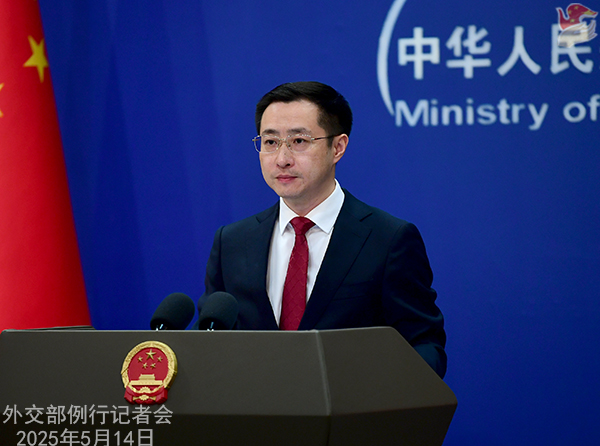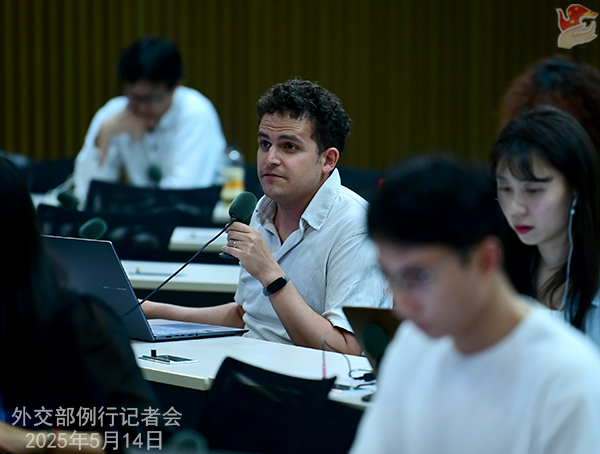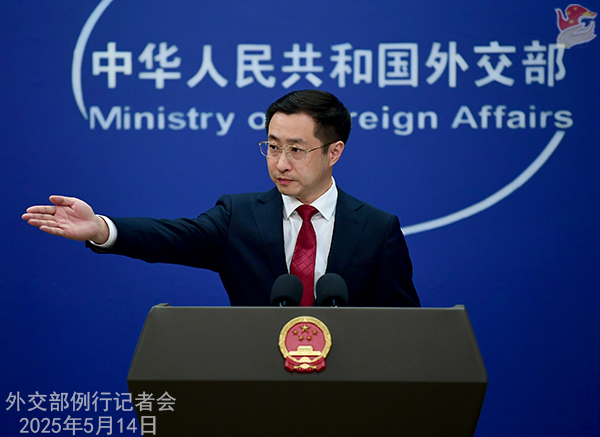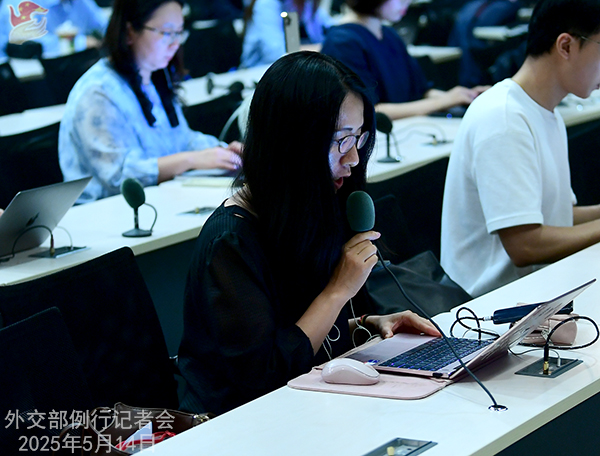
People’s Republic of China


People’s Daily: On May 13, China and LAC countries held the Fourth Ministerial Meeting of the China-CELAC Forum in Beijing. Can you share the outcomes and impact of the meeting? How does China evaluate the role of the China-CELAC Forum? What’s China’s expectation for China-CELAC cooperation in the future?
Lin Jian: Yesterday, the Fourth Ministerial Meeting of the China-CELAC Forum was successfully held in Beijing. President Xi Jinping attended the opening ceremony and delivered a keynote speech. Colombian President and the current CELAC President Gustavo Petro, Brazilian President Luiz Inácio Lula da Silva, Chilean President Gabriel Boric, and President of the New Development Bank Dilma Rousseff also delivered addresses. President Yamandú Orsi of Uruguay, the incoming CELAC President, sent a congratulatory message. Chinese Foreign Minister Wang Yi moderated the plenary meeting. Twenty-eight LAC countries, 6 regional organizations and over 50 ministerial officials attended the meeting in China. The meeting adopted the Beijing Declaration and the China-CELAC Joint Action Plan for Cooperation in Key Areas (2025-2027), and also reached more than 100 three-year cooperation projects. China announced 20 measures in supporting LAC countries’ development. On the 10th anniversary of the official launch of the China-CELAC Forum, this meeting has sent the voice of China and CELAC jointly meeting challenges through solidarity and coordination.
The biggest highlight of this meeting is that President Xi Jinping systematically summarized the successful experiences of the development of China-LAC relations. He announced the launch of five programs which are Solidarity Program, Development Program, Civilization Program, Peace Program and People-to-People Program. The five programs will further consolidate political foundation, promote common prosperity, deepen mutual learning between civilizations, promote regional stability and people-to-people friendship which points the direction for the building of a China-LAC community with a shared future.
The following important common understandings were reached at the meeting: The China-CELAC Forum was a success over the past decade, and the two sides will expand the areas and improve the quality of cooperation; China and LAC countries share a common future in development, and the two sides will stand firmly together despite winds and rains and resist external disturbances; China-LAC solidarity goes with the trend of the times, and the two sides, as important members of the Global South and important forces promoting multipolarity and greater democracy in international relations, will enhance solidarity and cooperation and jointly address transformation and instability in the world; China-LAC cooperation enjoys promising prospects, as the two sides combined create a mega-sized market with a population of 2 billion, and this will provide new driving forces and new opportunities for the growth of both sides and the wider world.
China-LAC cooperation can withstand winds and rains and transcend mountains and oceans over the distance of half a globe. China will deliver on the initiatives announced by President Xi Jinping, and work with LAC countries to continue to support each other on issues concerning each other’s core interests and major concerns, jointly implement the Global Development Initiative, the Global Security Initiative and the Global Civilization Initiative, uphold the multilateral trading system and an environment for open cooperation, and defend international fairness and justice as well as world peace and stability. We believe that as we address risks and challenges in solidarity and coordination, and pursue development and prosperity through mutually beneficial cooperation, the China-CELAC Forum will head firmly towards the next golden decade, and open up a new chapter of the Global South seeking strength through unity and building a community with a shared future for mankind.
CCTV: It was reported that after China-U.S. Economic and Trade Meeting in Geneva, China will lower the tariffs on U.S. goods from 125 percent to 10 percent for an initial period of 90 days. Meanwhile, the U.S. will cut its tariffs on Chinese goods to 30 percent, 20 percent of which is imposed on the grounds of the fentanyl issue. What is China’s comment?
Lin Jian: China and the U.S. reached multiple positive common understandings at the economic and trade meeting in Geneva. Both sides agreed to slash tariffs on each other’s goods. The U.S. committed to remove 91 percent in tariffs, and suspend 24 percent in “reciprocal tariffs.” China would accordingly remove 91 percent in counter tariffs and suspend 24 percent in counter tariffs. The two countries respectively retain the remaining 10 percent in tariffs.
Right after the U.S. groundlessly levied two rounds of tariffs on Chinese goods under the pretext of the fentanyl issue, China responded with tariffs and non-tariff countermeasures to firmly safeguard its legitimate rights and interests. These countermeasures remain in force.

EFE: Former Uruguayan President José Mujica passed away yesterday. What is China’s comment?
Lin Jian: Mr. Mujica is a prominent and beloved leader for the people of Uruguay. He is an old and dear friend for the Chinese people, and contributed to the advancement of bilateral relations and mutually beneficial and friendly cooperation between the two countries. We mourn for Mr. Mujica’s passing and our hearts go out to his family and the people of Uruguay.
Kyodo News: Yesterday, a court in Shanghai sentenced a Japanese man to 12 years in prison for espionage, but the details of the charge weren’t disclosed. The Japanese government asks China to ensure the transparency and openness of the judicial process. What’s China’s comment?
Lin Jian: China upholds the rule of law. Our judicial authorities have handled this case in strict accordance with legal procedures and protected the lawful rights of the person concerned. Japan needs to earnestly respect China’s judicial sovereignty, and help its citizens abide by China’s laws and regulations and not engage in illegal and criminal activities in China.
Reuters: Putin’s proposal for direct talks with Ukraine in Istanbul on May 15 came shortly after Chinese President Xi Jinping visited Moscow and the two held talks. Was this a factor? Did the two sides discuss the war in Ukraine?
Lin Jian: We have shared details about President Xi Jinping’s visit to Russia, and released readouts about his participation in relevant events, which you may refer to. Let me stress that China has been committed to promoting talks for peace since day one of the conflict, supported resolving the crisis through dialogue and negotiation, and stressed the need for parties to create conditions for the resumption of direct talks between Russia and Ukraine. That has always been China’s position.
Reuters: India’s Ministry of External Affairs has released a statement in which it makes clear its opposition to China naming places in Arunachal Pradesh. Does the Foreign Ministry have any comment?
Lin Jian: Zangnan is part of China’s territory. The Chinese government has standardized the names of some parts of Zangnan. This is within China’s sovereign rights.
Global Times: On May 13 local time, Mark Carney officially took office as Canada’s Prime Minister. What is China’s comment?
Lin Jian: Premier Li Qiang has sent a congratulatory message to Prime Minister Carney, in which he said China attaches importance to growing its ties with Canada. He also expressed readiness to work with Prime Minister Carney to move China-Canada relations in the right direction of improvement and advancement, as the two countries mark the 55th anniversary of diplomatic ties and 20th anniversary of their strategic partnership this year, on the basis of equality and mutual respect, and deliver more tangibly for the two countries and two peoples.

Reuters: The UK and China successfully held an economic and financial dialogue earlier this year. Britain has now also done trade deals with India and the U.S. How does China view those trade deals and what are China’s expectations for its ties with the UK?
Lin Jian: China and the UK are permanent members of the UN Security Council and the world’s major economies. The significance of China-UK relations goes beyond the bilateral scope. During their meeting on the sidelines of the G20 summit last year, President Xi Jinping and Prime Minister Keir Starmer reached important common understandings on further advancing bilateral ties. Closer engagement and cooperation between the two countries is conducive to the two countries’ respective prosperity and to global economic growth, response to global challenges, and more stability and certainty in today’s world. China stands ready to work with the UK in the spirit of mutual respect, properly handle differences, embrace openness and cooperation, and expand exchanges and mutual learning to open the next chapter of a sound and stable China-UK relationship.
On the trade deals between the UK and relevant countries, let me stress that cooperation between countries should not target or harm any third party.
Bloomberg: The former Ambassador to China Nicholas Burns said the U.S. has made it clear to Beijing that failure to coordinate on the fentanyl issue must come at a price and that China does have the capacity to stop the flow of precursor chemicals. What is the Ministry’s response?
Lin Jian: I have just stated China’s principled position on the fentanyl tariff issue. China has made it clear more than once that fentanyl is the U.S.’s problem, not China’s. It’s the U.S.’s responsibility to solve the issue. Despite the goodwill China has shown, the U.S. wrongly slapped tariffs on Chinese imports by citing the issue of fentanyl. The move has dealt a heavy blow to China-U.S. dialogue and cooperation on counternarcotics, and gravely hurt China’s interests. If the U.S. truly wants to cooperate with China, it should stop vilifying and shifting the blame on China, and seek dialogue with China based on equality, respect and mutual benefit. China firmly opposes the irresponsible and false accusations made by the U.S. individual you mentioned.
Reuters: Does the Foreign Ministry have any comment on the arrival of the new U.S. Ambassador David Perdue? What hopes does the Foreign Ministry have for his tenure? And how would his arrival affect the U.S.-China relationship?
Lin Jian: China’s position on the China-U.S. relations is consistent. We are willing to provide facilitation for Ambassador Perdue in performing his duty in China.




